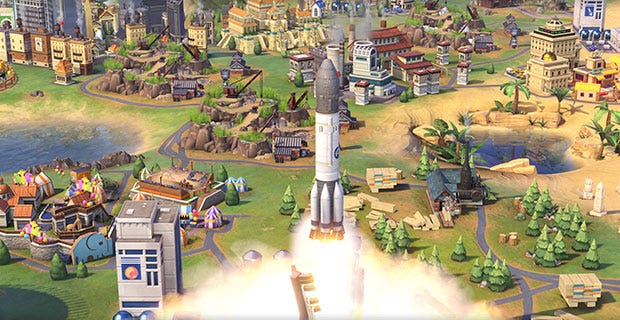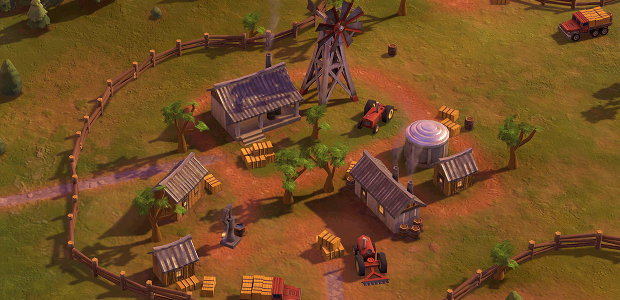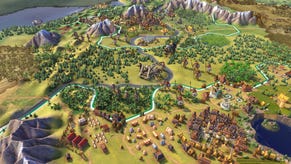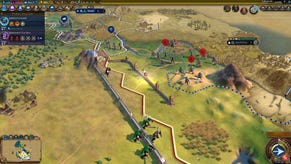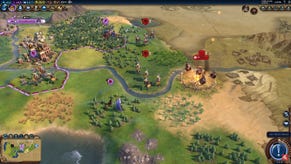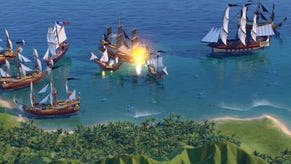The successes and failures of Civilization 6
Means to an end-game
When Sid Meier’s Civilization VI [official site] came out last October, it represented a novel take on the series, boasting two parallel tech trees and an innovative city system that broke the previous games’ monolithic metropoli into distributed districts, with attendant tile-space-management gameplay. Nine months on, I spoke to lead designer Ed Beach about the finer points of the game’s design, what needs work, and Firaxis’ approach to designing expansions and DLC.
As the lead designer of its latest iteration, Beach is, perhaps unsurprisingly, pleased with the overall direction the series is going. “Something that I’ve been very happy with is the way, over the last few titles in the series, we have increased the level of uniqueness of each civilisation,” he said. “I think in the very earliest Civ titles the civs weren’t really unique, but then you got to Civilization III and Civilization IV and they had simple characteristic statistics – they would be expansionist and industrious, or something like that, or religious and militaristic. But, really, there was just a collection of 8 or 10 of those different traits, and you could apply a couple of them to each civilisation, but they weren’t really taking a civilisation and giving it a whole unique gameplay style of their own. In the two most recent titles – Civ V and VI – we have handcrafted specialised abilities, in many, many cases, for each civilisation, so that we can really vary the playstyles. So, for instance, if you look at Civ VI, with our Norwegian civ led by Harald Hardrada, they are the premier civ for being able to get out on the oceans, they can cross oceans earlier than anyone else, and they have fierce abilities to raid up and down the coastlines and land amphibious armies that no-one else has.”
This differentiation of civilisations, Beach says, can be a difficult design process. “Every time you’re designing a civ, you’re taking [Civilization V’s or VI’s] simple systems and you’re saying ‘well, in order to capture the essence of either this personality or this empire we’re going to have to take all those game rules, and we’re going to have twist them, and distort them, and change them in unique ways’, four or five times, for each of the forty civilisations we have in that game […] We don’t want to make every single one of those a special case. If we can come up with patterns and then apply those patterns over and over again – that’s something that people will get used to and they’ll understand. So, for instance, we introduced Poland in one of our first DLCs, and they had the ability to grab extra land whenever they built an Encampment – we called that a ‘culture bomb’, that’s one of the Civilization terms for grabbing land nearby you from either unclaimed territory or another player – and we decided that we wanted to do the same thing for Australia, because they needed lots of land for all their cattle and sheep farms. And so what we ended up doing was every time they created a pasture they also grabbed more land, and again that’s a culture-bomb mechanic.”
The differentiated civs are one of the tools Firaxis uses to address problems with the game. “We wanted to make sure, [when we looked back at] our base game of Civ VI, that the world was a little bit more dynamic, and the diplomatic landscape was a little bit more unpredictable and treacherous. So in DLC 4 we introduced two civs, Persia and Macedon, that both sort of take that to different extremes. Persia is led by Cyrus, who was quickly able to conquer Babylon and a bunch of neighbouring empires with a series of quick strikes – surprise wars – and so we gave them bonuses [meaning] that if they declare a surprise war they’re very, very effective at that, and they can do some really rapid conquest. And then the other civ we shipped at the same time was Macedon, with Alexander the Great, and he just has an amazing capacity to build up an army, start on a spree of conquest, and just keep it going throughout the game, because we took away all the war weariness penalties that a civilisation normally faces. When you’re playing Macedon you don’t suffer those at all. And so those were both civilisations that were tuned to the fact that we felt like the diplomatic landscape in the game when it first came out wasn’t quite as treacherous and dynamic as we’d like it to be.”
The espionage system, he says, is one feature of the game that has room to improve. “The part of the espionage game that people love is building up spies who have a set of traits that work well for certain types of missions, and that’s allowed the players to get very, very attached to their spies […] I think people will love it if we can go and expand the role of the spies, and maybe give them even more promotions that they can choose from, so we can role-play with these secret agents even more.”
But is there an issue, I asked, with defence against spying being completely passive, unlike military defence? “We toyed with that when we first put in the espionage system,” he told me, “that there would be a whole other layer to it, where you would have police forces that you would assign, and when a spy initially triggered that he was trying to steal something from you there could be a chase sequence in your city and the police could be trying to track down the spies. And, you know, I’m obviously a big fan of spy movies and novels and stuff, because that’s definitely the way the espionage system has been headed here, but the more I looked at that, I thought that that was maybe drilling down a layer too deep.
"...the defence could be a little bit more active – you’d feel more agency, and more capable of fending off what was going on. But we have improved that over some of the previous Civ titles […] The way the counterspying game works is, each counterspy you put out in the field defends not only the tile he’s in but all the adjacent tiles. So there is a little bit of an element of positional play, an active role in the defence there. I think if we could come up with ways to make that even more engaging and active that would be a plus, though.”
The endgame is another area Beach isn’t completely happy with. “In Civilization V, when we got to the Brave New World expansion, we felt like the game was very good up through the Renaissance – we’d done a lot of work with religion in the earlier expansions – but we felt like at the end of the game it really needed to be brought into the 20th Century. We really needed to see these ideological governments in conflict with each other, we really needed to set the stage for the dramatic World War period, so that was where the main focus for Brave New World went, and I definitely feel like that did a good job of giving the proper sense of time and place to the conflicts of the 20th century. And I do think that’s an area that we could definitely make some improvements on in Civ VI. We kept most of the gameplay systems that we had from Brave New World, and those all kind of did find a home with Civ VI, but some of them weren’t quite as deep, or didn’t have quite as much of a full sense of time and place, as some of the ideological conflicts that we had in Civ V. We had the World Congress in Civ V that really set the stage for ‘now there’s a global community, and all your actions are going to be looked at by that global community’. We haven’t brought that to Civ VI yet, so that’s definitely an opportunity.”
For many people, Civ V's expansions brought it from passable to essential, and if the future of VI involves a successfully fleshed-out endgame and improved diplomacy and espionage, it'll look even more solid than it did at launch. The move toward specialised civs could see a drift away from broader mechanical reinvention in favour of additional nations, but Beach's interest in expanding espionage and possibly reintroducing concepts such as the World Congress shows a desire to rehaul the thinner systems. That is almost certainly a good thing.
